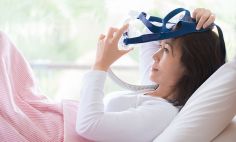Children with sleep apnea have an increased risk of developing high blood pressure in their teens, a new study has found. High blood pressure is a major risk factor for heart disease.
Sleep apnea is a common disorder that causes people to briefly stop breathing during sleep. It typically happens multiple times during a single night's sleep. While it mostly affects adults, about 10% of school-age children also suffer from sleep apnea. Nearly half of these children will outgrow the disorder. The other half must deal with a potentially chronic and progressive health problem.
The researchers, supported by the National Institutes of Health, began by testing several hundred children aged 5 to 12 for sleep apnea. A small proportion of those tested were diagnosed with the disorder. Eight years later, the researchers evaluated all the children again. They were tested for both sleep apnea and high blood pressure. The results showed that children who continued to have sleep apnea in their teens were nearly three times more likely to develop high blood pressure than children who never had sleep apnea. Children who were initially diagnosed with sleep apnea but had few or no symptoms by the time they became teens did not show an increased risk of high blood pressure.
Several studies have looked at the link between sleep apnea and high blood pressure in adults. But few have checked the risk of high blood pressure in children with the disorder.
Like adult sleep apnea, childhood sleep apnea can be treated. Treatment may include surgical removal of tonsils and adenoids. Some children may be helped by using a CPAP machine, which delivers air through a mask to keep the airway open during sleep. For children who are overweight, adopting a healthy eating and exercise plan can also help.







